GamesRadar+ Verdict
Pros
- +
Mesmerizing visuals and setting
- +
Tight
- +
responsive controls
- +
Plenty to uncover in each whimsically designed stage
Cons
- -
First getting the hang of proper scissor-shearing
- -
Acclimating to the movement of your cursor-like companion
- -
Replaying a lengthy level in search of an elusive bonus
Why you can trust GamesRadar+
Puppeteer is, in a word, enchanting. Like its wooden protagonist, it seems ordinary enough at first sight: a 2D platformer staged as a theater production, complete with red drapes and an unseen audience that chimes in with "Oohs" and "Ahs." But like any good play, it will captivate you from the get-go and have you enraptured to the very end. Puppeteer is a game of boundless character, gorgeous aesthetic, and genuine heart. Despite a few design flaws, it's an experience that will utterly delight children at heart and platformer aficionados with equal aplomb.
You play as the silent hero Kutaro, a young boy whose soul has been imprisoned in a puppet's body by the dastardly Moon Bear King. Using a pair of magical clippers known as Calibrus, you'll have to jump and--despite what your mother may have told you--run with your scissors across the Moon, defeating the Moon Bear King's Chinese zodiac-themed generals before taking on their grizzly leader. Your pixie-like companion Pikarina and eloquent narrator Gregorius are with you every step of the way. You'll be glad to the have their company, thanks to their delightful banter and endless bickering.
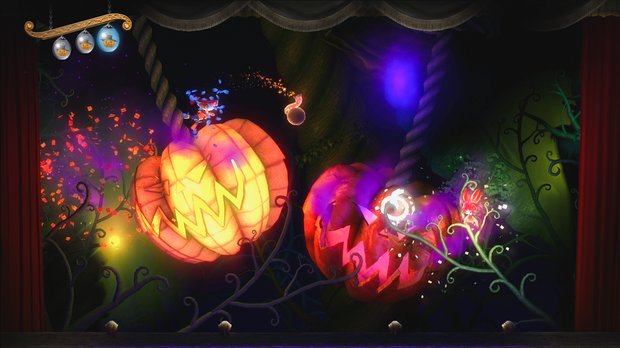
"Puppeteer is a game of boundless character, gorgeous aesthetic, and genuine heart."
Platforming in Puppeteer feels as it should, with responsive controls and satisfying hops. But at first, it's tricky coming to grips with Kutaro's scissors, which are used both as a weapon and a method of travel. Cutting your way through the literal set pieces in your environment is a skill you'll need to practice a bit, but once you've collected a few permanent upgrades and mastered the art of shearing through enemies, Kutaro's movements feel as smooth as lacquered wood.
Visually, every inch of the Moon's surface is stunning. Perspective is used to amazing effect to make each stage feel like a living diorama in your TV, and the atmosphere strikes just the right balance between making Kutaro's world feel like a wondrous fantasy or a spectacularly produced puppet show filled with props. The stage variety is incredible, as is the level of detail in each backdrop; there's really no telling what Kutaro and Pikarina will encounter next, but it's sure to enthrall you.
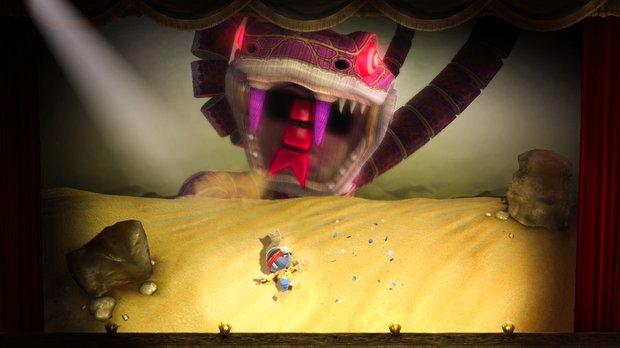
"Perspective is used to amazing effect to make each stage feel like a living diorama in your TV..."
If you're a fan of Disney theme parks, you'll adore the animatronic-like movements of the characters, especially when they break out into song. You're also liable to fall in love with the tone of the story, which has the right mix of heartfelt sentimentality and bits of self-deprecation and dark humor to delight kids and grown-ups alike. Puppeteer's vibe feels like Pinnochio (particularly the Pleasure Island bit) mixed with the earnest-yet-frightful ethics of The Nightmare Before Christmas.
For a game whose hero never utters a word, Puppeteer miraculously manages to ooze character from every pore. That's thanks in part to the adorable animations, which factor heavily into a primary mechanic. Kutaro quite literally loses his head from the onset, and must collect any of 104 different heads, each with a delightful, unique action, to complete his journey. Your heads act as your life bar; take damage, and you'll have a moment to chase after your wooden noggin before it rolls away for good. This excellently tempers the difficulty level, giving you a chance to learn from your mistakes after you've frantically reclaimed your head.
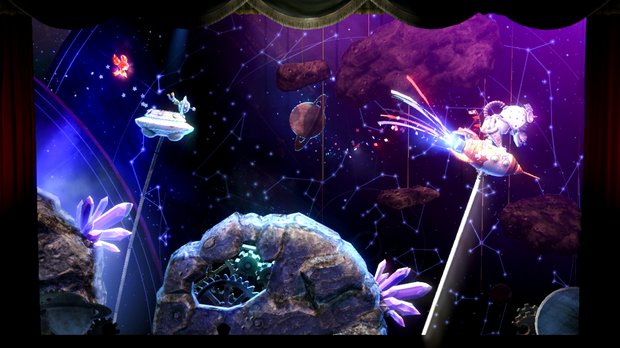
"Puppeteer's vibe feels like Pinnochio [mixed with] The Nightmare Before Christmas."
Your choice of cranium matters, too, because another key component of Puppeteer is observation. There are seven acts, composed of three curtain stages each, and they're all filled to the brim with secrets. In order to rescue all the captured souls in a given level, you'll have to keep an eye out for intriguing bits of scenery in the background. Some of these are hiding glimmering Moonshards--think Mario's coins--but others offer a path to bonus levels, provided you brought the right head along.
That requirement can be a tad irksome at times because you won't always have the head you need. Every head has a single secret attached to it; once you've found it, you can swap without worry. But there will inevitably be times when your maximum capacity of three heads forces you to swap one out, only to stumble upon the secret of the now-discarded head in the next room with no way to get it back. It's a system that encourages you to replay the stages, which will delight completionists, but with each Curtain taking between 15 and 25 minutes to complete, going back to claim a single secret won't seem worth it to the average gamer. And those same completionists will find it incredibly difficult to free every soul and reveal every secret with the way the stage designs don't permit too much backtracking. Still, it's a challenge that's there for those who want it, or totally skippable for those that don't.
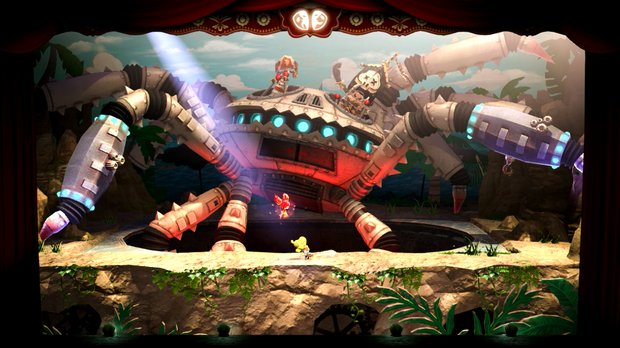
"...completionists will find it incredibly difficult to free every soul and reveal every secret..."
Poking and prodding the background will be required to progress, and the method to do so may initially agitate you. When Pikarana isn't wisecracking in her charming Valley Girl voice or having delightful, fourth wall-breaking arguments with the narrator, you'll move her around with the right analog stick to "Investigate" chunks of the backdrop. This kind of cursor-like control may annoy some, but after a few stages, poking around every nook of the stage will feel like second nature. At best, you'll uncover a bonus stage; at worst, you'll still be treated to a hilarious line of dialogue. You can also invite a second player to control Pikarina with via a Dual Shock or Move controller. It's essentially the PS3 equivalent of being a star-bit collector in Super Mario Galaxy, but it's still a pleasant way to enable a little audience participation.
You may also be interested to know that Puppeteer supports 3D visuals, provided you've got the TV and glasses to support it. The theatrical level structure definitely lends itself nicely to a bit of added visual depth. Your mileage with the 3D experience will vary based on your setup and tolerance for potential eye strain, but it's a nice addition to what's already a visually mesmerizing game.
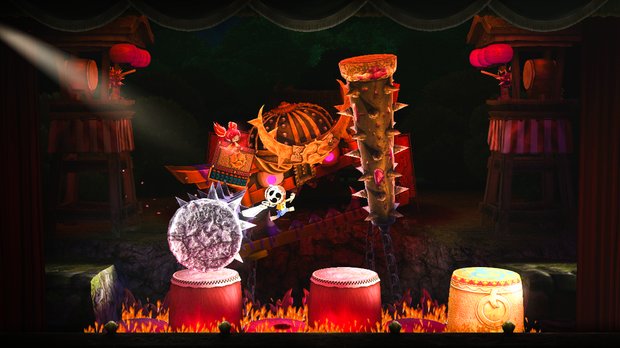
"Your mileage with the 3D will vary...but it's a nice addition to what's already a visually mesmerizing game."
As a whole, Puppeteer feels reminiscent of some of the 16-bit era's most legendary sidescrollers, like Super Mario World 2: Yoshi's Island or the Donkey Kong Country franchise. Like those timeless SNES classics, Puppeteer blends a groundbreaking visual style with demanding-but-gratifying gameplay to create a truly resplendent platformer. The eight-or-so hours you'll spend on Kutaro's journey are a joy from beginning to end, and completionists will eke out even more time if they can stomach a few errant annoyances. With such a vibrant atmosphere and fundamentally fun gameplay, Puppeteer is a cut above most contemporary 2D sidescrollers.
More info
| Genre | Platformer |
| Description | Set in a puppeteer theater, players take control of a boy that has been transformed into a puppet. |
| Platform | "PS3" |
| US censor rating | "Rating Pending" |
| UK censor rating | "" |
| Release date | 1 January 1970 (US), 1 January 1970 (UK) |
Lucas Sullivan is the former US Managing Editor of GamesRadar+. Lucas spent seven years working for GR, starting as an Associate Editor in 2012 before climbing the ranks. He left us in 2019 to pursue a career path on the other side of the fence, joining 2K Games as a Global Content Manager. Lucas doesn't get to write about games like Borderlands and Mafia anymore, but he does get to help make and market them.




